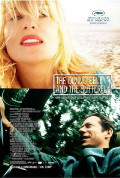
Directed by
Julian Schnabel
120 minutes
Rated M
Reviewed by
Sharon Hurst


The Diving Bell And The Butterfly
Synopsis: Jean-Dominique Bauby (Mathieu Amalric) was a successful middle-aged man who suffered a major stroke leaving him with a horrific condition called “locked-in syndrome”. This meant that his fully-cogniscent brain was left inside a totally paralysed body. For a little over one year, before his death, he remained hospitalised with this condition, as staff around him battled to teach him communication skills. Amazingly, communicating with his left eyelid he wrote a book about his experience, upon which this remarkable and compassionate film is based.
In the first part of the film we see the world from the perspective of Bauby. Hence the opening shot is barely more than a blur in which we the audience are seeing what Bauby sees as he emerges from a coma with doctors peering at him and explaining the terrible circumstances of his body. Bauby’s voice-over articulates the thoughts going on in his head but it is soon apparent to us and to Bauby that no-one can hear him and he cannot speak. In an especially gruelling scene the doctors decide to sew up one of Bauby’s eyelids and we see this procedure from his eye outwards with everything gradually going darker as each stitch is inserted. In fact, about the first half of the film is shot with us, the audience, inside Bauby’s consciousness, seeing the world from his tragically diminished viewpoint.
The first time we ever see things from outside the sufferer’s vision is when he catches a glimpse of himself reflected in a window – mouth skewed sideways, with a one-eyed, immobile face. Once a self-confident, philandering lover boy, Bauby now, in his own words, looks like something that came out of a bottle of formaldehyde. Yet despite his dire condition a stoically ironic sense of inner humour pervades.
His speech therapist Henriette (Marie Josee Croze) uses a system whereby Bauby blinks once for yes and twice for no. This is then expanded as the alphabet is read out and he blinks when each required letter of the word he wants to say is spoken. And so, painstakingly, he learns to communicate. At first he wants only death, feeling like a diver trapped in a heavy helmeted suit, but he soon decides to stop pitying himself and to escape his “diving bell” through memory and imagination (his butterfly). From there his life takes off, as he dictates, letter by letter, his poetically-articulate memoir to the patient and loving Claude (Anne Consigny).
Balance is maintained in the film through scenes of flashback to Bauby’s former life as editor of 'Elle' magazine, to times with his children and to places he goes in his imagination, like a fine seafood restaurant with Claude.
Other characters in his life include Celine, (Emmanuelle Seigner), the mother of his three children, all of whom Bauby feels he treated shabbily and to whom he is unable to make amends There’s his friend Laurent (Isaach de Bankole) who reads to Bauby out of his favourite books. Then there are the poignant scenes in which Bauby remember shaving his house-bound old father, Papinou, (the wonderful Max von Sydow) and later when Papinou rings Bauby on the loudspeaker telephone and sobs over his son’s condition. Also significant is a friend Roussin (Niels Arestrup), who was a prisoner of terrorists for four years who gives Bauby vital advice to cling to what is human inside of him.
And this is the essence of this film: that what is human is not measured by externals, but by an indomitable spirit that can overcome almost anything. albeit a spirit only to be found in very determined and special people.
The film, not surprisingly, was nominated for four of this year’s Oscars (for directing, best adapted screenplay, cinematography and editing) but it did not win any although it already has a raft of other awards and nominations behind it. Director Schnabel, a successful painter, has in his two previous films, Basquiat (1996) and Before Night Falls (2001) represented artists in distress, yet here he capture something truly heroic – a human being able to assert his humanity in the face of overwhelming odds and create from a tragedy something truly transcendent.
Want something different?





